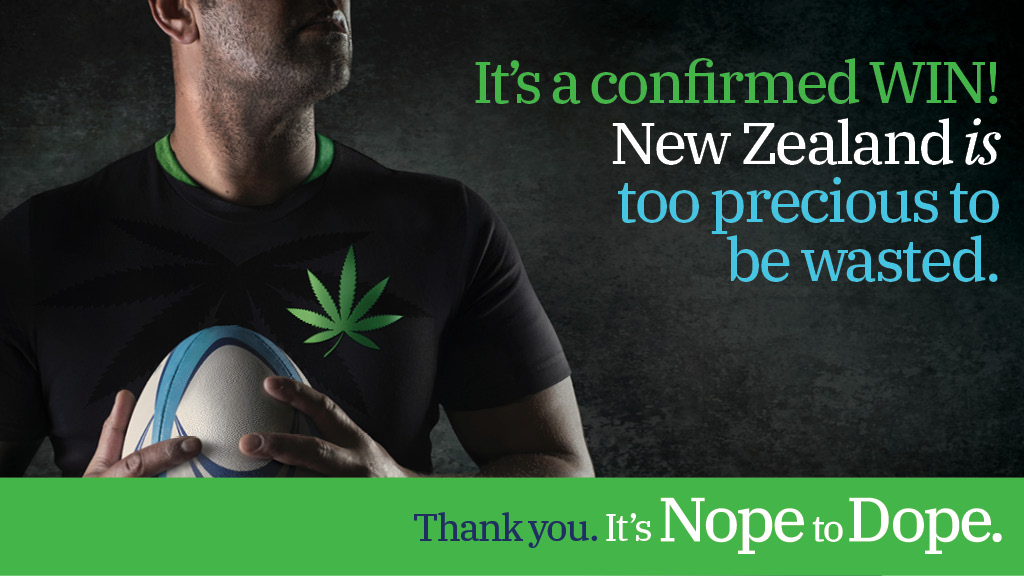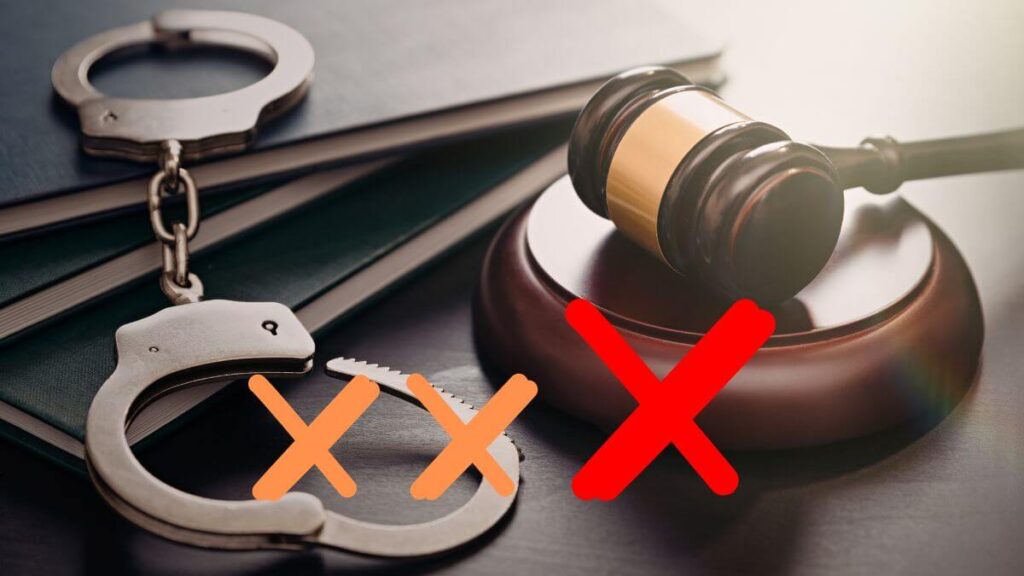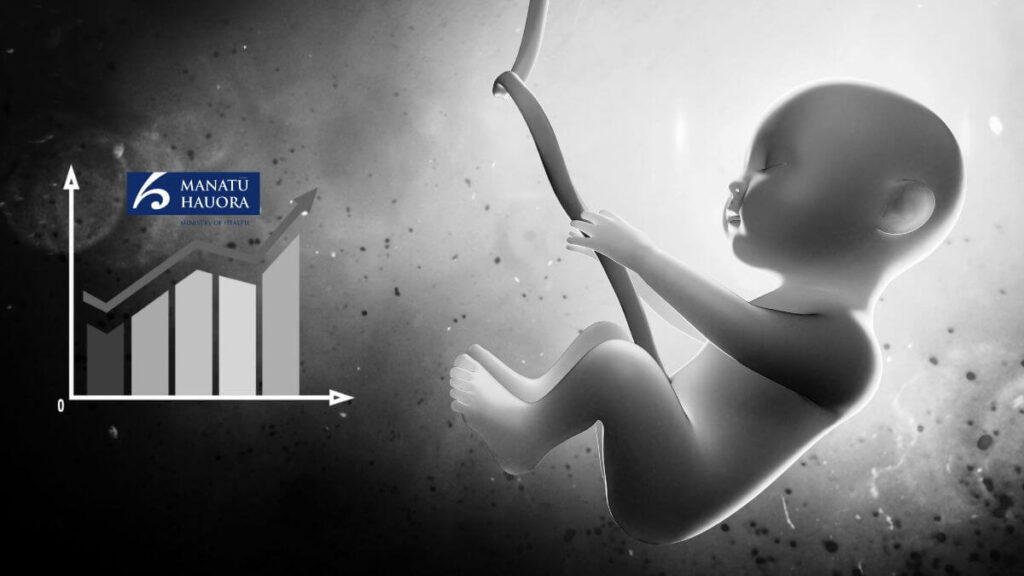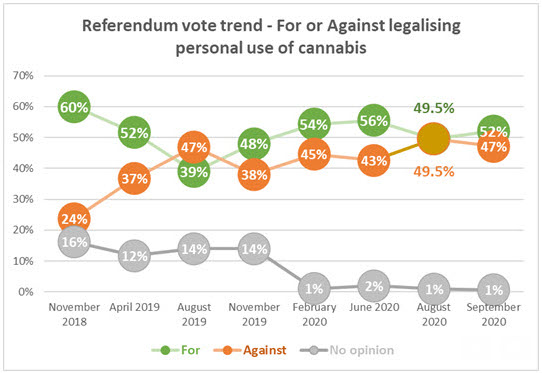 Despite the YES campaign starting the debate with a 36-point lead two years ago (according to Horizon Polling), the SayNopetoDope campaign won the cannabis debate by 2.3 points (an incredible 38-point turnaround).
Despite the YES campaign starting the debate with a 36-point lead two years ago (according to Horizon Polling), the SayNopetoDope campaign won the cannabis debate by 2.3 points (an incredible 38-point turnaround).
This was also despite four major factors which favoured the YES vote:
- An avalanche of favourable media support which even experienced broadcasters observed as very bias – (“the prominence of the pro-campaigners in mainstream media, the lack of balance”, and “The media in general has featured, to my eye, favourable coverage of why we should be legalising the stuff, as opposed to why we shouldn’t”).
- A strong campaign by the Electoral Commission to enrol young voters using the enticement of being able to vote in the dope referendum – a group of voters more likely to vote yes.
- Accusations of bias against the government. In a paper in the NZ Medical Journal, the academics described the claims in the government pamphlet delivered to all voters as “inflated”, “unrealistic”, and “unlikely to be achievable”. The BERL report – which the government tried to hide – revealed that pot shops will be as noticeable in number as fast food outlets, and that usage will increase by almost 30%. And government advice – which the government also tried to hide and was forced to release by the Ombudsman – said that “there would almost certainly be unintended and unanticipated consequences of legalising cannabis for personal use”, and that “there is insufficient data to understand the medium- to long-term impacts”
- 10 organisations promoting a YES vote – aided by a favourable media. Some of these organisations receive government funding, and possibly industry funding.
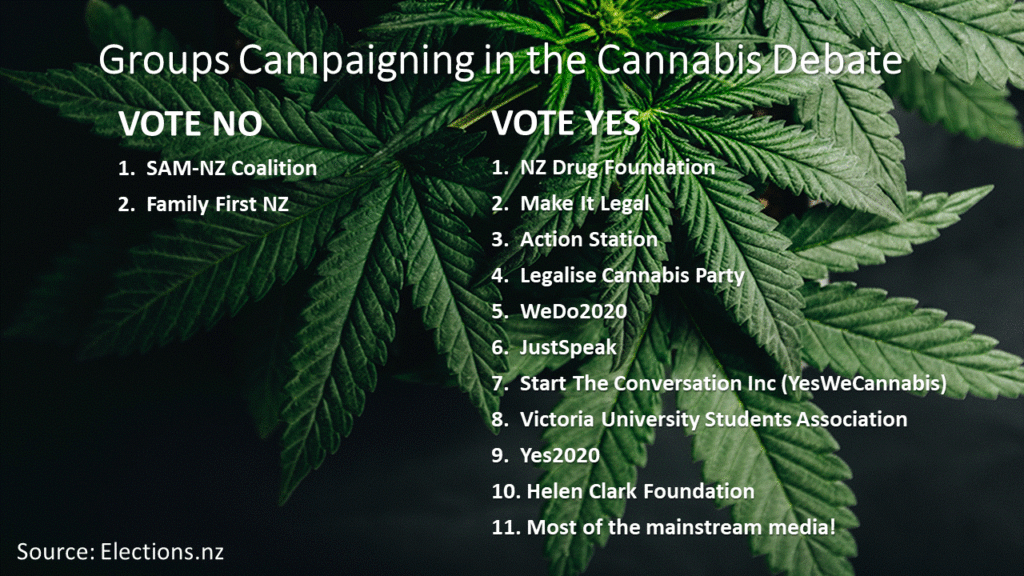
So, with all the inertia behind the YES campaign, how did the NO campaign ever win this debate?
PROBLEMS WITH THE YES CAMPAIGN
- they used Helen Clark as the front person. Prime Ministers who have been voted out can express their opinion, but not lead controversial campaigns – especially when they’ve already annoyed people opposing charity concerts being held
- they used Green MP Chloe Swarbrick who comes across as condescending and lectures people. Labelling the opposition as ‘juvenile’ ‘fear-mongering’ and not being mature in their attitude alienates thinking voters. It also reminded people of the extremism of the Greens (which many voters tactically voted to reduce their influence)
- the YES campaign slogans “On our terms” (because it hasn’t worked anywhere else?), “We Do” (sounds like a debate about marriage), “Make it legal” (make what legal?), were vague and boring and didn’t even include the key word ‘”Yes”. The YES campaign was disjointed with no unity and clear messaging
- the NZ Drug Foundation’s ‘nuclear’ $300k campaign before the official campaign period annoyed the hell out of people – especially when the YES campaign was accusing the NO campaign of having ‘deep pockets’. Labelling NO voters as needing to ‘get mature’ also annoyed people.
- the YES campaign spent more time and energy attacking the ‘messenger’ rather than the ‘message’

- nobody believed the claims that the NO campaign was somehow being bankrolled by American interests – which of course they weren’t
- the NO campaign peaked at just the right time (when advance voting was about to begin). YES campaigners like Helen Clark were delivering pamphlets after most people had made up their mind
- the majority of voters didn’t believe the narrative that legalisation would reduce harm (it will increase harm), or that it would get rid of the gangs (it won’t), or that young people would be less likely to want to use it (despite adults being able to legally grow and consume it far more freely).
- the “it will make lots of tax money” argument simply didn’t add up – because voters recognised the excess social harms and fiscal costs already experienced with alcohol and tobacco
- arguing that “lots of people doing it justifies changing the law” didn’t work. Otherwise we would need to liberalise the laws around child abuse, family violence, assault, fraud, meth (P) use, drunk driving, shoplifting & sexual assault
- arguing that the “law was racist” didn’t work. Most thinking people realised that bias and racism is a far bigger issue than saying that allowing people the legal right to get wasted & suffer addiction harms will solve the problem. Telling people that if they vote no they’re racist also didn’t help.
- the attempt to legalise smoking cannabis directly contradicted the successful SmokeFree2025 messaging and campaigning
- the YES campaign supporters tried to bring alcohol into the debate, but that actually reinforced the concerns people had about big corporates exploiting communities for profit and addiction, not health
- neutral voters who tried to engage with YES voters on Facebook were treated like imbeciles and dismissed
- YES voters trolled the NO campaign pages but, through their commenting style, actually reinforced the perception that cannabis use was not good for the intellect! Threats made against the NO campaign also didn’t help.
- The Patrick Gower documentaries and the movie “Toke” (conveniently timed to air just before the referendum) simply reinforced stereotypes of an unrelatable subculture which turned middle New Zealanders off.
The one thing the YES campaign did get right?
They used medicinal marijuana as a smokescreen – which fooled a lot of people into voting yes. Exit polling showed that 60% of Yes voters voted in order to make cannabis available for medicinal purposes such as pain relief. This is despite the fact that medicinal cannabis has already been legalised, and the Government clearly spelt out on the official referendum website that “Medicinal cannabis is not included in the proposed law that will be voted on in the referendum.” The silence by the media and YES campaigners around the private members bill of Dr Shane Reti which was drawn just before the election confirms that the YES campaign was keen to use the medicinal aspect to increase the yes vote.
 THE SUCCESS OF THE NO CAMPAIGN
THE SUCCESS OF THE NO CAMPAIGN
- the NO campaign was clever, clear and edgy – “Too precious to be wasted”, “Say Nope To Dope”
- Because we’re not that keen on blowing our own trumpet (!), let’s quote the left-leaning website The Spinoff (no friend of Family First in previous coverage):
“a ruthless display of message discipline… It’s textbook stuff: clear and concise…. It’s difficult to see the same clarity of messaging and relentlessness on the yes side…. It seems clear that the Say Nope to Dope campaign has out-worked and out-messaged pro-legalisation campaigners, with the balance of polling starting to seriously shift. The old sporting analogy about one team “just wanting it more” occurs to me a lot… I marvel at being able to see up close a machine that’s been so influential in shaping and driving conservative politics in New Zealand. I wonder if the forces of social liberalism really understand what they’re up against.”
- One of our biggest weapons was SaynopetoDope’s campaign strategist Ken Buist. Here’s his reflection on why the NO campaign won:
“The NO campaign used both creativity and science to engage voters with a very distinctive emotive campaign. It used strong visuals with a simple strong message. Importantly this created an emotional connection to many voters. We used a sophisticated omni-channel campaign, optimised and targeted to relevant cohorts. Unlike the YES campaigns, we did not rely on one or two channels only. We used multiple channels, as it’s important that voters saw our messages across the diverse media landscape. We covered everything from grass-roots campaigning, print media, social media, TV on demand, radio and billboard. Virtually nothing was excluded. Much of the YES messaging failed to make an emotive connection with mainstream Kiwis. Their messaging seemed to be designed for their own echo-chamber.
Our main proposition was built upon the reality that the risks of legalisation far outweighed any benefits for most New Zealanders, particularly the poorer communities who’ve already seen the proliferation of liquor stores, pokie machines, and loan sharks. Our campaign was built upon care and concern. This proposition was communicated in our overarching tagline – “New Zealand is too precious to be wasted”.”
- Our other biggest weapon without doubt was our spokesperson Aaron Ironside. Anybody who heard or saw Aaron in action will appreciate just how effective he was. And it seemed like the media worked very hard to keep him out of the debate because they knew the threat he was to the YES vote!
THE HIDDEN WEAPON OF THE NO CAMPAIGN
Simple – it was YOU!
And that’s what both the media and the YES campaign completely underestimated – and actually wanted to ignore.
The support base behind all the organisations involved in the SayNopeToDope Campaign contributed to the campaign with time, energy and funding. And it paid off.
WHAT IF
What if we hadn’t shown up to this debate?
Without doubt, the YES campaign would have won with a significant majority and we would have legalised cannabis, dope shops and home-grows throughout our neighbourhoods and communities within the year. Drug use would be normalised – and legalising other drugs would be next on the agenda.
Which kinda reminds us of one of our favourite quotes:
Thank you for your support in this (successful) campaign.
